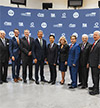What’s Prompting HQ Relocations?
Companies are relocating their headquarters for myriad reasons, including to lower costs, access skilled talent, improve accessibility, and burnish their corporate image.
Q4 2018
Head offices relocations are coveted by economic development teams because of the prestige, human capital, cluster momentum, and economic and philanthropic stimulus they bring to a city. Lucrative financial incentives designed specifically to woo corporate headquarters are now commonplace among states — case in point, the huge incentive packages offered to Amazon to snare its HQ2. And, thanks to the improved economy, companies have more cash to relocate their corporate headquarters.
“Once considered ‘off the table’ in corporate restructuring programs, the corporate headquarters office is now in play and more mobile than ever before,” says John H. Boyd, principal of The Boyd Company, a site-location consulting firm in Princeton, N.J. “Today, it is the high end, high-profile, and high-growth segment of the multibillion-dollar corporate relocation industry.”
Operating Costs
One of the best ways to save money is through the consolidation of facilities — including headquarters. Toyota’s move from Torrance, California, to Plano, Texas, in 2017 (which included about 5,000 transferees) was “not just a change of address of its North American HQ address, but a fundamental change in the way Toyota operates its core businesses in North America,” says Boyd. “The move represented a major consolidation of its sales, manufacturing, customer service, finance, and engineering —all under one roof.”
In May 2018 Chipotle announced it would close its offices in Denver and New York and relocate its headquarters to Newport Beach, California, consolidating various functions including business development, marketing, communications, finance, supply chain, food safety, technology, and human resources. “This consolidation will help drive sustainable growth while continuing to position us well in the competition for top talent,” says Chipotle CEO Brian Niccol. For similar reasons, Gerber Products Company will invest $5 million to relocate its U.S. headquarters from New Jersey to the corporate headquarters location of its sister company, Nestlé USA, in Arlington County, Virginia, “where closer proximity to Nestlé USA’s headquarters will provide efficiencies that will be reinvested in our people and products,” states Gerber president and CEO Bill Partyka.
Talent Acquisition
More companies are moving their corporate headquarters to urban areas in search of skilled workers — especially millennials. A top priority for today’s young talent is a city’s lifestyle offerings. Companies want to be where the talent is, especially as the labor market tightens. Therefore, companies are investing heavily in office development in both leading and secondary markets.
Companies want to be where the talent is, especially as the labor market tightens. For example, DISCO, a legal technology company, plans to move its corporate headquarters from Houston to Austin. Determining factors were technology talent pool, proximity to top universities, and a strong local technology community. The move will create 150 Austin-based jobs across all functions, including engineering, product management, services, sales, marketing, and finance. “There is no place like Austin in terms of the energy, culture, spirit of innovation, and overall talent,” says Kiwi Camara, DISCO founder and CEO.
For Amazon, the decision to split its HQ2 between New York City and the Washington, D.C., region was all about “talent, talent, talent,” according to a Brookings analysis.
Accessibility/Airport Connections
Easy access to air travel — especially nonstops flights — is essential for smooth business operations and efficient use of time. This is especially true for international travel. Good connections improve communications among clients, employees, and business colleagues around the world and enhance work/life balance.
Nonstop, global connections were a big reason ConAgra decided to move from Omaha to Chicago in 2015. Not only was the company concerned about the challenges of finding enough highly educated millennials in the smaller cities of the Midwest, “it longed for robust global air service from a major gateway airport like O’Hare, something Omaha’s Eppley Field could not compete with,” says Boyd.
In March 2018 Emerald Transformer announced it would relocate its corporate headquarters from Florida to McKinney, Texas (near Dallas) — in close proximity to Dallas/Ft. Worth International Airport. This move enhances corporate support for Emerald’s eight locations, 450 employees, and customer base. “Moving to Dallas will allow us to access all our facilities with direct flights and will serve as a centralized hub as we continue to expand,” says Emerald Transformer CEO Stuart Prior.
Incentives
In today’s economic climate, corporations expect tax credits and other financial incentives in return for moving their HQ to a new location. They keenly understand the value of their presence to a city. States compete fiercely for HQ projects and the prestige they bring — as well as the potential for supporting markets to move in and create cluster growth.
With an offer of $40 million in New Jersey tax incentives, Teva Pharmaceuticals USA has decided to move its Pennsylvania headquarters to Morris County, creating hundreds of high-paying jobs. In another recent relocation, VF Corporation — provider of global apparel brands such as The North Face — will move its headquarters from North Carolina to the Denver metro area in 2019, driven in large part by up to $27 million in job-growth incentive tax credits from the Economic Development Commission — one of the largest incentive packages ever offered by the state of Colorado.
Corporate Image
Additionally, companies are increasingly aware that consumer loyalty is not only driven by the quality of their products, but also their positions on social and environmental issues. As a result, companies want to be in cities that reflect their culture and core values. A recent example is VF Corporation’s relocation to Denver, which has one of the strongest American outdoor-retail brands in the country. The decision by the 119-year-old company to relocate was a tough loss for North Carolina, considering VF Corporation was its fifth-largest public company and generated nearly $12 billion in global revenue in 2017.
In today’s economic climate, corporations expect tax credits and other financial incentives in return for moving their HQ to a new location. “Colorado is an area with an unrivaled heritage and culture of outdoor and activity-based lifestyles, as well as a thriving business environment,” says Steve Rendle, chairman, president, and CEO of VF Corporation. “It is a great strategic fit for our business, and we are excited to be relocating our headquarters and several brands to the metro Denver area. We believe that the creation of our new headquarters will help us to unlock collaboration across our outdoor brands, attract and retain talent, and accelerate innovation.”
The Next Key Driver
According to Boyd, social impact will be the next key driver in the HQ-relocation decisions. Social policies relating to the environment, for example, have been influencing power-hungry data centers to locate in cities with green power, such as Quincy in Washington’s Columbia River Valley. Other social policies have backfired, such as North Carolina’s controversial “Bathroom” bill and Indiana’s “Religious Freedom” bill, which dramatically impacted corporate site selection decisions. Numerous companies cancelled or postponed relocations and expansions in these states, citing the two controversial and divisive bills — now both repealed.
Increasingly, companies need to consider how their social impacts will be viewed by the public — not just by creating jobs, but how they create positive or negative social change. This is especially true for high-profile, high-tech, and consumer-oriented firms with abundant resources such as Google or Amazon.
If Amazon had been intent on creating as much social benefit as possible, the best city on the company’s short list would have been Newark, according to local politicians. Boyd agrees: “With the highest unemployment and poverty rates and the second-lowest median income…of all the finalist cities, a thumbs up for Newark would have given Amazon a huge social standing boost, not to mention an incredible transformative impact on New Jersey’s largest urban center,” says Boyd.
Looking ahead, Boyd expects cities to incorporate the social impact narrative into their corporate headquarters attraction campaigns. “This will be a strong trend as corporations increasingly focus on building their brand and currying the favor of socially-conscious millennial workers, and also generating goodwill among lawmakers looking for social good to rationalize support, including lucrative incentives,” concludes Boyd.
Project Announcements
Umbra Plans Reston, Virginia, Operations
02/15/2026
Utilidata Expands Ann Arbor, Michigan, Operations
02/05/2026
PC3 Health Plans Jeffersonville, Indiana, Operations
02/02/2026
Radical AI Plans Brooklyn, New York, Materials Science Operations
01/28/2026
DSV Global Transport and Logistics Plans Mesa, Arizona, Headquarters Operations
01/24/2026
Poland-Based JGB Brothers Plans Bamberg County, South Carolina, Production Operations
01/23/2026
Most Read
-
Top States for Doing Business in 2024: A Continued Legacy of Excellence
Q3 2024
-
Data Centers in 2025: When Power Became the Gatekeeper
Q4 2025
-
Speed Built In—The Real Differentiator for 2026 Site Selection Projects
Q1 2026
-
Preparing for the Next USMCA Shake-Up
Q4 2025
-
The New Industrial Revolution in Biotech
Q4 2025
-
Strategic Industries at the Crossroads: Defense, Aerospace, and Maritime Enter 2026
Q1 2026
-
The Skilled Trades Are Ready for a Digital Future
Q4 2025



